- Home
- Alison McGhee
All Rivers Flow to the Sea Page 4
All Rivers Flow to the Sea Read online
Page 4
“Ha!” William T. says. “It’s a trick question. I already know how you’d eat it.”
“How would I, then?”
“B. Spread on all three pieces, evenly but so thinly that you can barely taste it.”
“You’re right! That is how I’d eat it. Are you psychic, William T.? Tell the truth.”
“I am,” William T. says. “I cannot lie. I already know how Younger here would eat it too. Younger would save her little lumps of butter all week long. And then she’d spread her three pieces of bread with an inch of butter, and eat them all at once. I’m right, aren’t I, Younger?”
Yes. He’s right.
“Do I get the bird of the day free, as a bonus?” Angel asks.
“Indeed you do, Angel. The bird of the day is the black-capped chickadee.”
“A chickadee? Did you choose that just for me, William T.?”
“Perhaps,” William T. says. “Perhaps I did.”
He and Angel smile. They like to flirt with each other. It’s safe flirting, because Angel loves her husband and William T. loves Crystal. I don’t flirt with anyone. I don’t know how to flirt, unlike Ivy, who flirted with Joe Miller all the time. Are some people just born knowing how?
“‘Little roving flocks of black-capped chickadees,’” William T. reads from his bird book, “‘are often the brightest spark of life in bleak winter woods.’”
Outside Ivy’s window the bleak winter is gone. The grass is green now, so much greener than when they first moved Ivy here in the beginning of April. That makes me angry. Grass, how can you be so green, when my sister can’t see you? Stop. Stop being so beautiful, so alive, so goddamned green. Stop growing. Stupid, idiot, beautiful grass.
William T. was with me when the doctor showed me the x-ray.
“It’s an enormous intraparenchymal hemorrhage,” the doctor said. “She cannot recover from this.”
“But she was talking to me,” I said to the doctor. “She was talking to me, right after it happened.”
“Yes,” he said. “The swelling hadn’t yet taken over. We call that the lucid interval.”
She was almost brain-dead but not quite. That’s what they said. She didn’t open her eyes; she didn’t move her eyes when they opened them for her and brushed them with the cotton swab; she didn’t gag; she didn’t look toward the ice water in her ear. They turned the ventilator off and we waited.
Waited.
Waited.
Waited.
And she tried to breathe.
“She has a very slight respiratory drive,” they said. “But you must understand: she will never recover from the brain trauma.”
Then the woman with the curly hair came into the waiting room and asked about Ivy’s heart. Ivy’s liver. Ivy’s kidneys.
“No,” my mother said.
And so they kept Ivy alive. My mother couldn’t let her go.
Could I have let her go? If someone asked me to make the decision instead of my mother — Tell us what to do: keep your sister’s heart beating or let her go — what would I have said? My mother’s face was set, the way it gets sometimes. She doesn’t let anything behind that face. She listens to no one. She’s a wall. If you stood on the walkway above the conveyor belt on the floor of the brewery, looking down at my mother darting back and forth, righting the fallen bottles, you wouldn’t know that about her.
“No,” my mother said. “No.”
Her hands were over her ears at that point.
When I think of my sister Ivy, my heart aches. My heart aches, my heart that is contracting and pumping in my chest right now, contracting and pumping, pushing and pulling my blood, my rich red blood, throughout the rivers and islands and gorges of my body.
Doctors could take away my sister’s heart and put it inside someone else’s chest, and connect all the tubes and stitch it up and prescribe medicine to make the strange person not reject my sister’s heart, not reject it, not say, What the hell is this, this thing, this unfamiliar thing beating away inside my chest, and, Get the hell out of here. And my sister’s heart would keep that person alive.
But where would Ivy be? Sometimes I think about that. It’s a mystery. It’s an unknown world. I think about the Higgs boson that opens the door to another, as yet completely undiscovered, realm. When I studied the Higgs boson for my project, I read that only 4 percent of the universe is made up of atoms with known forces, such as gravity and electromagnetism, the ordinary stuff that makes water and rocks and potholders and scalpels. The other 96 percent is dark matter. Dark energy. And no one knows what dark matter and dark energy are.
“No,” my mother said. “No. You can’t understand. I can’t lose her.”
That’s what I remember from the night of the accident, after Tom and Spooner and William T. and Crystal — where did they come from? — got us to the hospital. Ahead of the ambulance.
Fluorescent lights. A long tiled hallway. People dressed in blue, people dressed in white, standing in a circle around my mother.
“No,” she said.
They turned to me when my mother stopped listening, when she put her hands over her ears.
“Your father?”
That’s how they said it, as if they had already figured out that your father wasn’t part of the picture. As if there were a single-word multiple-choice question.
Father? Check all that apply:
____Missing in action
____Hasn’t seen wife or daughters in nine years
____Living in New Orleans last we heard
I shook my head. No. The one doctor had a look of frustration on his face, and he turned back to my mother.
“No,” she said.
Eventually everyone disappeared, and my mother was alone under those fluorescent lights. That’s what I remember, even though I know that William T. and Crystal and Spooner and Tom Miller and I were there too. I still can see my mother’s face that night, the way her cheeks hollowed under the long ribbons of fluorescence. After a while William T. reached out and placed his hands over her hands over her ears and gently pulled them down.
“Home, Younger?” William T. asks me once we’re in the truck, headed north.
I shake my head. I don’t want to watch my mother rocking and listen to her not talking about Ivy. It tires me out, the effort it takes not to talk about Ivy.
“Eggs, then?”
I nod. And we drive past my driveway, past the house where my mother is home from the brewery, and on up Jones Hill to William T.’s house. Back in North Sterns, back from Ivy’s room, back from Angel and her concentration camp bread and butter and the black-capped chickadee bonus bird of the day.
William T.’s making me scrambled eggs the way he makes them for me. Slow and patient, that’s his method. Other people can make scrambled eggs in one-quarter the time it takes William T. to make them. But other people’s scrambled eggs taste nothing like William T.’s. He makes them for me quite a bit, whenever I’m up at his house. Which is more and more.
“You were right,” I say. “About the way I’d eat the bread and butter.”
“Of course I was right,” he says. “I know my Younger.”
“William T.?”
“Younger?”
“What was my father like?”
“Your father?”
“Yeah. My father.”
I wait. William T. pours the eggs into the hot butter in his special egg pan.
“He was a man of bad decisions.”
It sounds as if he’s read a book and memorized it for the day when I would come to him, asking about my father. Fathers of North America. Who else can I ask? Not my mother. Since that time, that long time when she stayed in bed, neither Ivy nor I have said a word to her about our father.
A man of bad decisions. Okay. I wait.
“Yes,” William T. says, as if I’ve asked a question when I haven’t. “Bad decisions.”
Sometimes William T. makes eggs for me in my own house, when he comes down to check on my mothe
r. My mother is not big on food in general, but she’ll eat William T.’s scrambled eggs. William T. shakes his head.
“Not good choices,” he says.
Not good choices. A variation on the theme of bad decisions. Okay. I wait.
“What do you want to know exactly, Younger?” he says, finally. I knew that if I waited long enough, even William T. wouldn’t be able to bear the silence. Like most people, he would want to fill it with words. Most people hate silence. They want to fill it, cover it up, make it go away. Down with silence, and its endless unspoken questions.
“Anything I can.”
“He lives down in Louisiana, last I heard. He went down there after he left Sterns.”
“No winters in Louisiana,” I observe.
William T. stirs the scrambled eggs. Around and around he stirs with his wooden egg-stirring spoon. The flame is so low you can barely see it, tiny blue tongues licking the bottom of the cast-iron pan. I sit on the stool and watch him. Finally he speaks again.
“Younger, the thing about your father is that he didn’t like himself in his natural state.”
Okay —
“He preferred a little embroidery on his reality. Let’s put it that way.”
Okay —
“He loved your mother. I know that he loved her — you could see it. But he loved that embroidered reality more.”
Okay —
But what about me and Ivy? Did our father love us too?
The eggs are finished. Quivering pillows of buttery yellow. William T. spoons them onto a saucer instead of a plate. He knows I like to eat them from a small saucer rather than a big plate, and with a spoon rather than a fork. I picture my father, a young man in Louisiana. Lying on his back in the middle of a small park in New Orleans. I saw a picture of such a park once.
“If he’s not dead,” William T. says, “then he’s almost forty years old.”
In my mind, jazz musicians play softly about him. Tourists with hot beignets from a hot beignet store wander by, powdered sugar drifting down upon my father like the snow he left behind.
“Imagine that,” William T. says. “Forty years old. Time marches on, doesn’t it, Younger?”
He wipes his special egg pan dry with a dish towel and shakes his head. Forty years old. I don’t even know what my father looks like.
“They’re talking about Ivy in school,” I say.
I didn’t know I was going to say that. William T. stiffens the same way that Jimmy Wilson does whenever he sees me now, unlike Warren, who after I lay down with him at the gorge that night just looks at me with a lazy, knowing look. And smiles. A lazy, knowing smile that I hate. But given the choice between Jimmy Wilson’s rigid not-looking at me, I will take Warren Graves’s knowing smile. William T. looks at me with searching eyes.
“They’re talking about Elder?”
“They are.”
“What are they saying?”
“That she’s a human vegetable. That she can’t open her eyes. That she’ll be like this forever. That she’s only alive because my mother won’t let them pull the plug.”
Words, tumbling out. Tracy Benova and Todd Forrest, standing together at Tracy’s locker. Bits and pieces of other people’s conversations.
William T. is quiet. I watch his face. All I see is sadness. After a while he picks up his truck keys and clears his throat.
“You ready, Younger?”
“No.”
The egg pan is dried and put away; the sun has set. It’s time, but I don’t want it to be time.
“Your mother needs you.”
“My mother doesn’t visit her own daughter.”
William T. looks at me. I see his mind at work. He wants to say something, but he doesn’t know how to say it.
“Well, she doesn’t,” I say when he keeps looking at me with that look on his face. “You know it as well as I do.”
“Don’t underestimate your mother, Younger,” he says, which is what he always, finally, says.
Every night I watch my mother’s fingers moving. She can’t keep still. She, too, is moving water that wants to keep moving. She’s like the cascading water of the Sterns Gorge, dipping and eddying around rocks. Once in a while you can find a pool by the side of the bank, a still, deep pool where the water rests before giving in again to the tumble. On the hottest summer days, I sometimes lower myself into that pool. Spread my arms on the surrounding rocks and hang there, suspended. Cold seeps through my skin, cools my entire body. The top of my head is warm from the sun, and the rest of me cools and cools and cools until suddenly, I’m cold, and then too cold, and I haul myself out and lie on that long flat rock and wait for the sun to warm me again.
Would I give up the Sterns Gorge to get my sister back, back the way she used to be?
I would give it up. Goodbye, my rock and my water rushing by, so busy, so full of purpose, rushing by on your way, on your way to where you’re going. I give you up willingly, that I may have my sister back.
“Your mother doesn’t have an easy time of it,” William T. says, which is something else that he always says.
What I want to say is, Who does? Who the hell does have an easy time of it? Not Ivy. Not Ivy, who lies in bed with her eyes closed, the ventilator pushing air into her lungs through her tracheotomy, the faintest of sounds: wishhh, wishhh, wishhh.
Not my mother, whose fingers are always in motion. “You have no idea how noisy it is inside here,” she said once to Ivy and me, and pointed at her head.
But I do. I do know. I know all about noise and electricity, silent screams running up and down the waterways of my body. I know about walking, rhythm, the cadence of footsteps that tire my muscles and bring me peace, bring me peace, bring me peace.
“I try not to think,” my mother said in her Utica Club Brewery Employee of the Month interview. “The less I think, the better I am at my job.”
She’s good at her job. She should be; she’s been at the brewery more than twenty years.
All my life my mother’s hands have talked for her. Look down at her from the tour walkway, down on the assembly floor. See her thin hands as she rights the fallen and tipped bottles. See how graceful and quick they are. At night sometimes, when I was little, before the long time when my mother stayed in bed, I would wake to feel her hands on my forehead, stroking, stroking, stroking back my hair.
“I like to work hard and be all tired out,” she told the interviewer. “Keeps me out of trouble.”
Give her a garden and she’ll weed it. Give her a barbed-wire fence and she’ll fix it. Give her a sinkful of dirty dishes and she’ll wash them. Give her a pile of laundry and she’ll fold it.
Give her a daughter in a hospital bed and what does she do?
Nothing.
My Pompeii book, in my backpack, is two months overdue. Silently I read to myself, there at William T.’s kitchen table. I read about Pliny the Elder, who witnessed the disaster at Pompeii. He saw the thick black cloud advancing behind him like a flood. He heard women shrieking, children crying, and men shouting.
William T. stands up and stretches his arms above his head, the sure sign that I have to go now. That it’s time.
“They’re saying that she wouldn’t pull the plug,” I say.
“That’s true.”
“She won’t let her go, but she won’t visit her either.”
“Your mother does the best she can.”
“William T.?”
“Younger?”
“Can you pick me up at school from now on?”
He regards me. I can see the questions chasing themselves around in his brain.
Why does Younger want me to pick her up? Does she not want to take the bus? Did something happen on the bus? Should I ask her if something’s wrong? No, because so much is wrong that she wouldn’t even be able to answer such a stupid question.
If William T. asks me about the bus, will I be able to keep quiet about Jimmy and Warren and the gorge? I watch him and will him just to say yes
.
“Yes,” he says.
“Thank you.”
And he drives me back down the hill to where my mother is sitting and rocking and not talking about Ivy.
I rise in the early morning and walk into the kitchen in my bare feet. The floor is wooden. Be careful. Step lightly on the old boards. Splinters.
Make the coffee. Pour it into the daffodil mug and add the cream and stir in the sugar and bring it upstairs. Give it to Mom. On Thursdays she doesn’t go into work until nine.
“Here you go, Mom.”
And out the door I go. School. At 8:10 the un-bell will rip its way out of the speakers to find release in the corridors and hallways of Sterns High. No more un-bell for me. No more noise that splits my ears. No more bus. No more green vinyl seats. No more Katie the bus driver telling me to get the hell back there and sit your butt down. No more Jimmy, who won’t look at me anymore, and no more Warren, who will.
I walk.
I time my walk to get there after the un-bell has shrieked. In time for science, and history, and trigonometry, and the looks, and the silences, and the whispers.
Before I start my walk, I turn around and look up William T. Jones’s hill toward his white house and his broken-down barn. William T. is probably at his girlfriend Crystal’s diner, where he goes every morning. He meets his friend Burl Evans there for breakfast, and Crystal pours them both coffee, and William T. organizes the jam packets in their holders. I beam my thoughts to William T., sitting on his stool at the counter at Crystal’s Diner: Hi, William T. I’m off. I’ll see you this afternoon. Don’t be late.
That’s my good-luck ritual.
What if I tell him what I did last night, when the still water rose within me, overflowed its banks, and I walked to the gorge because I had to go to the gorge, and Todd Forrest was there, and he asked if he could kiss me, too, and I said I didn’t care and he put his arms around me and picked me up and he asked if he could unzip my jeans and I said I didn’t care and he had a condom, too, and he asked and I said I didn’t care and then it was happening again and it hurt again and stone was beneath me, stone all around me, the rushing water that I want to be rushing behind me where I couldn’t see it, flowing fast and free over more stone. I closed my eyes until it was over, and then I lay there and it was Ivy I saw, Ivy, silhouetted against the moon, standing in the paneless window of the hay barn.

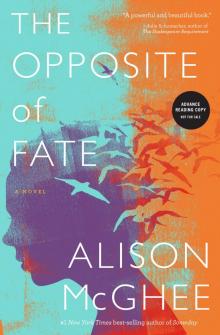 The Opposite of Fate (ARC)
The Opposite of Fate (ARC)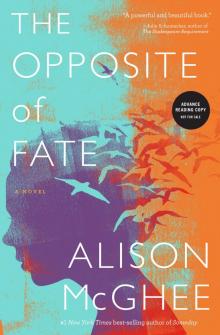 The Opposite of Fate
The Opposite of Fate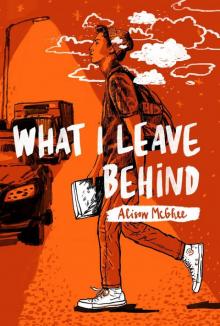 What I Leave Behind
What I Leave Behind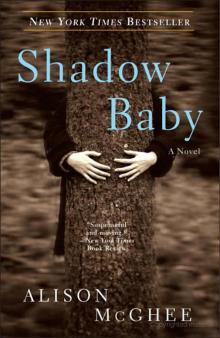 Shadow Baby
Shadow Baby All Rivers Flow to the Sea
All Rivers Flow to the Sea Was It Beautiful?
Was It Beautiful?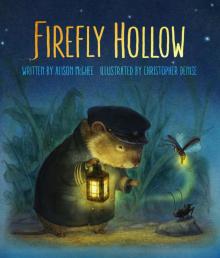 Firefly Hollow
Firefly Hollow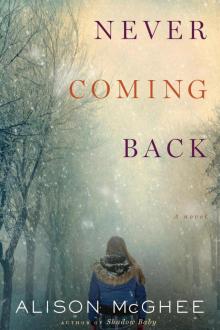 Never Coming Back
Never Coming Back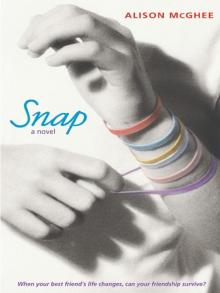 Snap
Snap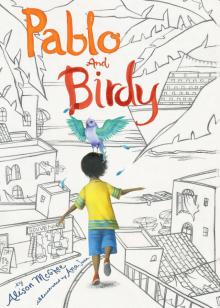 Pablo and Birdy
Pablo and Birdy